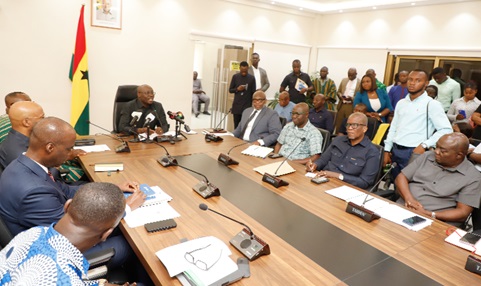The government has increased the price of cocoa beans paid to cocoa farmers from GH¢49,600 ($3,100) per tonne to GH¢51,660 ($5,040) per tonne.
This means the price per 64-kilogramme bag of cocoa beans has also increased from last year’s GH¢3,100 to GH¢3,228.75, or 4.07 per cent over the previous price, Daily Graphic computations indicate.
The Minister of Finance, Dr Cassiel Ato Forson, who announced this at a news conference in Accra yesterday, said the new price would take effect from Thursday, August 7, this year.
The minister also announced the reintroduction of the Free Cocoa Fertiliser programme as an additional support to the Ghanaian cocoa farmer, beginning the 2025/2026 crop year.
In addition, Dr Forson said the government would also implement a Tertiary Education Scholarship Scheme for children of cocoa farmers.
The Ghana Cocoa Board (COCOBOD) used to implement a scholarship scheme for children and wards of cocoa farmers to cover their secondary education, but it was rendered redundant by the introduction of the Free Senior High School (Free SHS) policy in 2017.
The minister of finance said the increase in the producer price represented 70 per cent of the gross Free-On-Board (FOB) value of cocoa per tonne, which summed up to about $7,200.
He added that the increment was coming on the back of a strong Ghana Cedi and declining inflation, reflecting the government’s commitment to improve the livelihoods of cocoa farmers, whose productivity was expected to yield about 650,000 tonnes beans for the 2025/2026 cocoa season.
Dr Forson said by maintaining the price at GH¢3,100 per bag for several months now amid the strong performance of the cedi, the government had put about GH¢1,114 into the pockets of the cocoa farmer for each bag of cocoa sold since the second quarter of 2025.
“This intervention by the government moved the farmer’s share of the FOB from 63.9 per cent to over 99 per cent,” he said.
Interventions
Dr Forson said the producer price review committee had also approved rates, margins and fees for all other stakeholders in the cocoa supply chain, including buyers’ margin, haulers’ rate, warehousing and internal marketing costs, fees for disinfestation, grading, sealing and weighing scale inspection.
In preparation for the new season, the Finance Minister said the Ghana Cocoa Board (COCOBOD) had made available jute sacks and related logistics for the smooth take-off of the 2025/2026 crop season.
Specifically, Dr Forson said the government would supply free cocoa fertilisers (both liquid and granular), free insecticides, free spraying machines, free fungicides and free flower inducers to farmers.
“Government strongly advises cocoa farmers to apply these inputs solely for the purpose of improving cocoa yield and their income,” he said.
Explaining the Tertiary Education Scholarship Scheme for children of cocoa farmers, Dr Forson said COCOBOD was yet to develop modalities to implement the scheme, which would take effect from the 2026/27 academic year.
Traceability
The Finance Minister said beginning 2025/2026 crop season, COCOBOD would roll out a Ghana Cocoa Traceability System to ensure that cocoa produced in Ghana could be traced from a plot of land to the port of shipment.
“This all-new system will ensure that Ghana is in full compliance with the due diligence requirements of the European Union Deforestation Regulations, which take effect from 31st December, 2025.
“The Cocoa Traceability System places Ghana in a better position to supply cocoa that is traceable, deforestation-free, child labour-free and compliant with EU regulations,” he said.
As part of the 2026 Budget, Dr Forson said the Ghana Cocoa Board Act, 1984 (PNDCL 81) would also be amended to make it illegal for the board to deviate or stray from its core mandate to protect the cocoa industry.
“For emphasis, COCOBOD will no longer engage in quasi-fiscal activities. It will be a prohibition. COCOBOD must focus on increasing cocoa yields, improving the cocoa value chain and the wellbeing of the cocoa farmer,” he stated.
As a result, he said the government had decided to transfer all ongoing cocoa roads projects to the Ministry of Roads and Highways.
“The government reaffirms its confidence in the new leadership of COCOBOD to turn around the cocoa industry,” he said, adding that the board would receive the needed support to enable it to boost cocoa yields, sustain the cocoa industry and reclaim its lost glory as the mainstay of Ghana’s economy.

